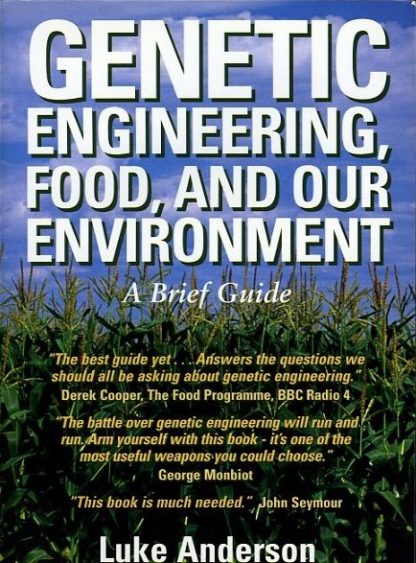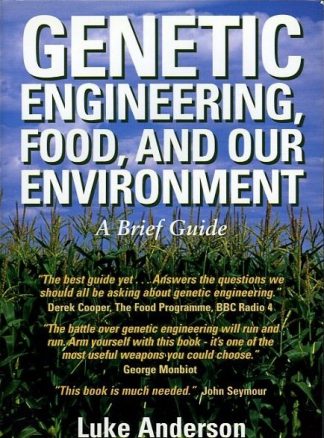
Genetic Engineering, Food and Our Environment
A Brief Guide
By: Luke Anderson
Publication Date: February 2000
€2.50
‘The battle over genetic engineering will run and run. Arm yourself with this book – it’s one of the most useful weapons you could choose.’
– George Monbiot, Professor of Environmental Sciences, University of East London
What is genetic engineering? Why are genetically engineered foods being introduced? What are the implications for health, farming and the environment? Is genetic engineering needed to feed the growing world population? Why are living organisms being patented? Who is making the crucial decisions about the future of our food supply? What can you do if you are concerned about these issues?
These are the questions raised and, to the extent possible, answered in this clear, concise guide to the labyrinth of genetic modification of food crops. Multinational corporations want us to believe that this food is safe. Critics argue that governments are sacrificing environmental and health safeguards in favour of commercial interests. In Ireland, the debate has only just begun – and reliable information is thin on the ground. Luke Anderson’s book is a clear-eyed guide for the lay reader who wants to understand the science, the politics and the economics of the genetic modification of food.
‘Crisply written, keenly argued, tightly and extensively researched.’ – Customer review
ABOUT THE AUTHOR
LUKE ANDERSON is a journalist and campaigner who specializes in issues related to genetic engineering.
| ISBN | 9781901866520 |
|---|
| Weight | 0.25 kg |
|---|---|
| Dimensions | 125 × 175 mm |
| Publication Date | February 2000 |
| Format | Paperback, 160pp |





Lilliput Press –
“It’s astonishing how much Luke Anderson has managed to pack into his little book. It explores the kind of questions you’d expect: what is genetic engineering? Why might it be dangerous? Do GM foods threaten human health? But it also raises global questions: can genetic engineering really feed the world? Is organic agriculture a better way forward? What effect could genetic engineering have on wildlife and people around the world? …In future, I’ll keep this book close by. And it isn’t all bad news: it is good to see a section on positive outcomes of research into small-scale farm yields and diversified crop systems. Throughout, these issues are discussed in straightforward language. I came away feeling enlightened and informed about this complex and serious subject.”-Kath Dalmeny, Earth Matters
“This book by Luke Anderson is for all of us who like to make informed decisions about what we eat and why. He explains what genetic engineering is, who’s developing these foods and why, and what are the implications for health, farming and the environment. Extremely well researched…Well worth reading whatever your viewpoint.”-Healthy Eating Magazine
Lilliput Press –
“Heard any of the following lately? ‘Protestors don’t understand the science, GE crops are just an extension of traditional crop-breeding techniques and will help to decrease pesticide use and feed feed the world’, etc. etc. How many of us can succinctly refute these familiar arguments? Well, if you are having trouble then this book is definitely for you. This pocket-sized, but comprehensive guide to the whole field of genetically engineered food explains exactly what the issues are. Stylistically it cannot be faulted for clarity and concision-Anderson covers the science, the precautionary principle controversy, cross-pollination, biodiversity, whether GMOs will feed the Third World, life patents, trade issues, the politics of public perception and financial patronage, and more. It also includes a list of campaigning organisations and information sources such as books, websites and magazines.”-Natural Products News
Lilliput Press –
“This little book is a godsend, summing up all the issues and arguments surrounding GM food in one handy package. Anderson asks all the right questions, and more importantly, demands that we ask some questions of ourselves and our leaders too: do we want GM food? Do we need it? What will be its impact? Thought provoking.*****”-Norfolk and Suffolk Preview
Lilliput Press –
“If you want to get a grip on the issues surrounding the debate on genetic engineering this book is an excellent place to start. Unashamedly critical, the book explores the technology, the risks to human health and the environment, the way in which genetic modification is being promoted and the interests behind its introduction. Even if you’re positive about genetically modified foods and crops, this book gives the case to answer. The book also supports a new approach to agriculture and life more generally espousing an organic, small-scale style. Although Luke Anderson has a philosophy which could be characterised as marginal, his arguments are framed to demand a mainstream response, making it much more challenging to the status quo than some other accounts. The book is short (160 pages in a handbook format) so details are sometimes lacking but because it is well referenced it provides a launch pad into the subject. As well as giving an easy to read account, the book also tells people what they can do if they’re concerned about GM crops and gives details of group working on the subject. At £3.95, it’s cheap too, making it an all round must whatever your perspective.” Dr Sue Mayer, Plantlife Magazine
Lilliput Press –
“It’s here at last! The ideal book about genetic engineering for the general reader. It’s short, clear, easy to uderstand and gives you all the basic information you need to know. Written by one of Britain’s foremost anti-GE activists, it’s both hard-hitting and authoritative. It covers: what GE is and how it works, its effect on the environment, farming and the food ssystem, the sordid politics of GE, what ordrinary people are doing to turn the tide, and a comprehensive list of organisations to contact. If you want to know about GE, have no previous knowledge and don’t want to wade through a full-length book, get this little one. If you already know a bit about it, you may find this concise presentation gives you new gems of information and helps you to present the case in a more effective way. “-Patrick Whitefield, Permaculture Magazine.
Lilliput Press –
“One of the best…A sobering book, it avoids hysteria, relying instead on primary evidence from scientific research, academic journals and biotech company reports, and has a mature, holistic perspective of the impact of genetically engineered food. Extensively backnoted and referenced, with a user-friendly contact list of anti-GMO campaigns. Highly recommended for highlighting how genetic modification is not just a ‘food’ issue.”-Chris Mitchell, The Spark
Lilliput Press –
“An excellent, well referenced guide which is strong on the potential environmental impact of genetically engineered crops and its impact on farming both in the developed and developing world.”-The Food Magazine
Lilliput Press –
“The battle over genetic engineering will run and run. Arm yourself with this book – it is one of the best weapons you could choose.”-George Monbiot, Professor of Environmental Sciences, University of East London
Lilliput Press –
“The best guide yet…Answers the questions we should all be asking about genetic engineering”-Derek Cooper, Presenter of the Food Programme, BBC Radio 4